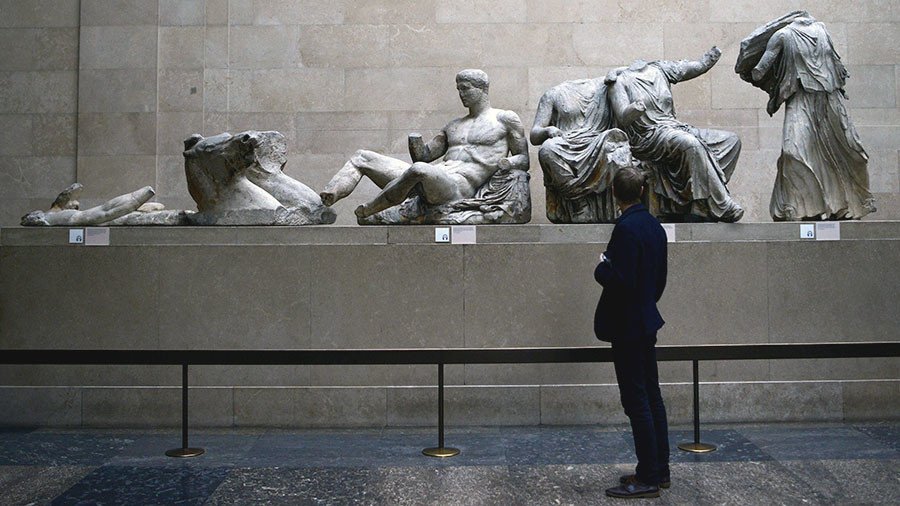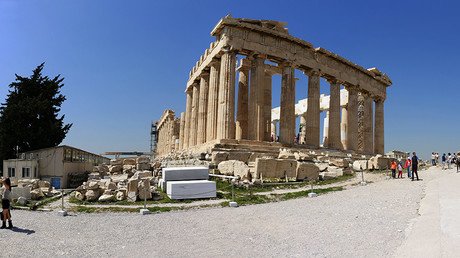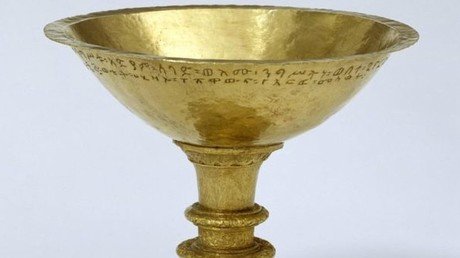Amid Prince Charles' visit, Greece demands return of Elgin Marbles looted by Brits 200yrs ago

Hosting Prince Charles and his spouse, the Greek president demanded that the UK return the precious Parthenon Marbles, which were seized in the early 19th century by Thomas Elgin and exhibited in the British Museum since then.
Greek President Prokopis Pavlopoulos voiced the request for the return of the Parthenon Marbles in the middle of a visit by Prince Charles and his wife Camilla. The royal couple arrived in Athens for a three-day official trip in a bid to improve bilateral relations between Greece and the UK.
Addressing the Prince of Wales, Pavlopoulos said that "the bonds of friendship" that connect the two countries "makes us hope for the return of the Parthenon Marbles and that the restoration of the unity of this glorious cradle of our Culture will ultimately be successful," as cited by local media.
Britain took ownership of the Parthenon Marbles at the beginning of the 19th century, thanks to then-British Ambassador to Greece Lord Thomas Elgin. Elgin removed the deity statues and up to 50 friezes depicting mythical battles from the once great Athenian temple. They were then loaded on a ship bound for England.
Many have questioned the legality of Elgin's actions, including the authenticity of the documentation that purportedly authorized them. He stated that he had obtained a firman – a decree by the Ottoman Sultan that ruled Greece at the time – which allowed his agents to access Parthenon.
However, several studies suggested that the firman was incorrectly translated into English and that the Sultan did not actually allow the removal of statues and reliefs from the Parthenon.
Following public outcry in Britain, including a response by renowned Romanticist poet Lord Byron, who accused Elgin of vandalism and looting, the Parliament agreed to acquire the art and place it in the British Museum, where it is now on display in the purpose-built Duveen Gallery.
Greece has repeatedly tried to regain the treasured pieces, but all attempts have failed so far. In 2014, UNESCO offered to mediate between Greece and the UK to resolve the dispute, but with little result.
A year later, in 2015, the British Museum argued in a letter that it would be "virtually impossible" for the pieces to be returned to Greece because multiple governments have refused to "acknowledge the trustees' ownership of the Parthenon sculptures in their care."
The world-famous museum argued that its collection is "not only for the British people, but also for the benefit of the world public, present and future." It claimed that "there is unanimous recognition that the original totality of the sculptural decoration cannot now be reassembled as so much has been lost," adding that the surviving sculptures "can never again take their place on the building."
Greece is not the only country to wants its artifacts back from the UK. Earlier in April this year, Ethiopia called for the return of treasures seized by British forces 150 years ago. The east African artifacts, including a gold crown and chalice, are currently on display at the Victoria and Albert Museum in London.
The items were sold to raise money for the British military and were first exhibited in 1872. Ethiopia has demanded that all of the looted antiquities be sent back on a permanent basis, declining an offer of a long-term loan by the V&A Museum.
Like this story? Share it with a friend!















